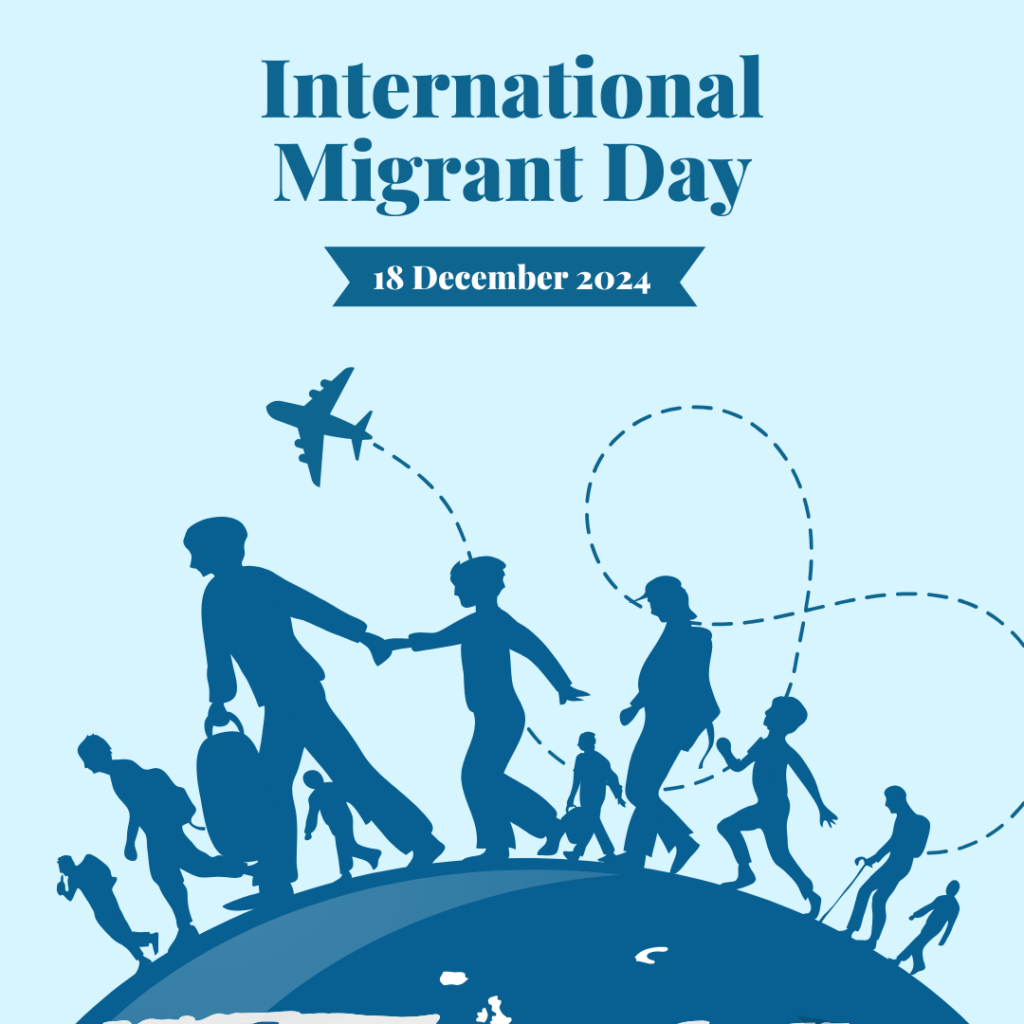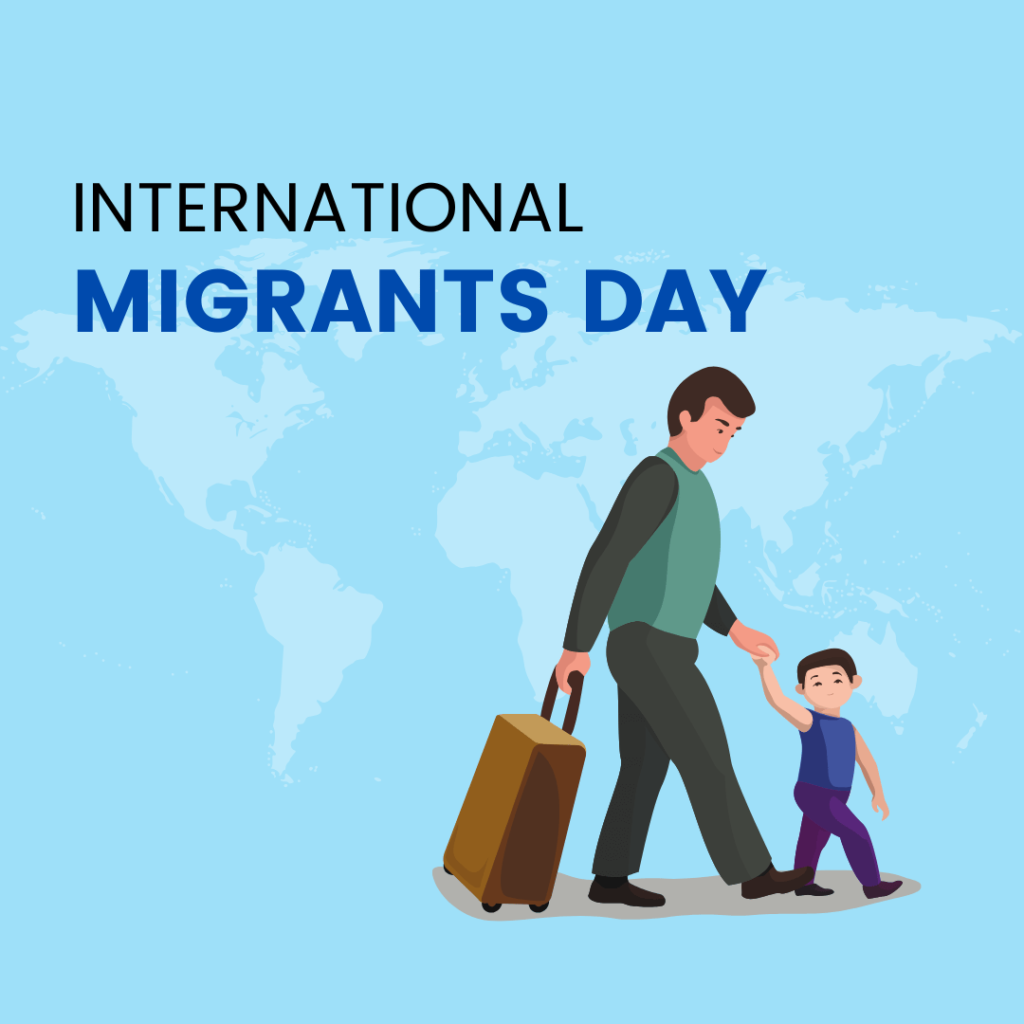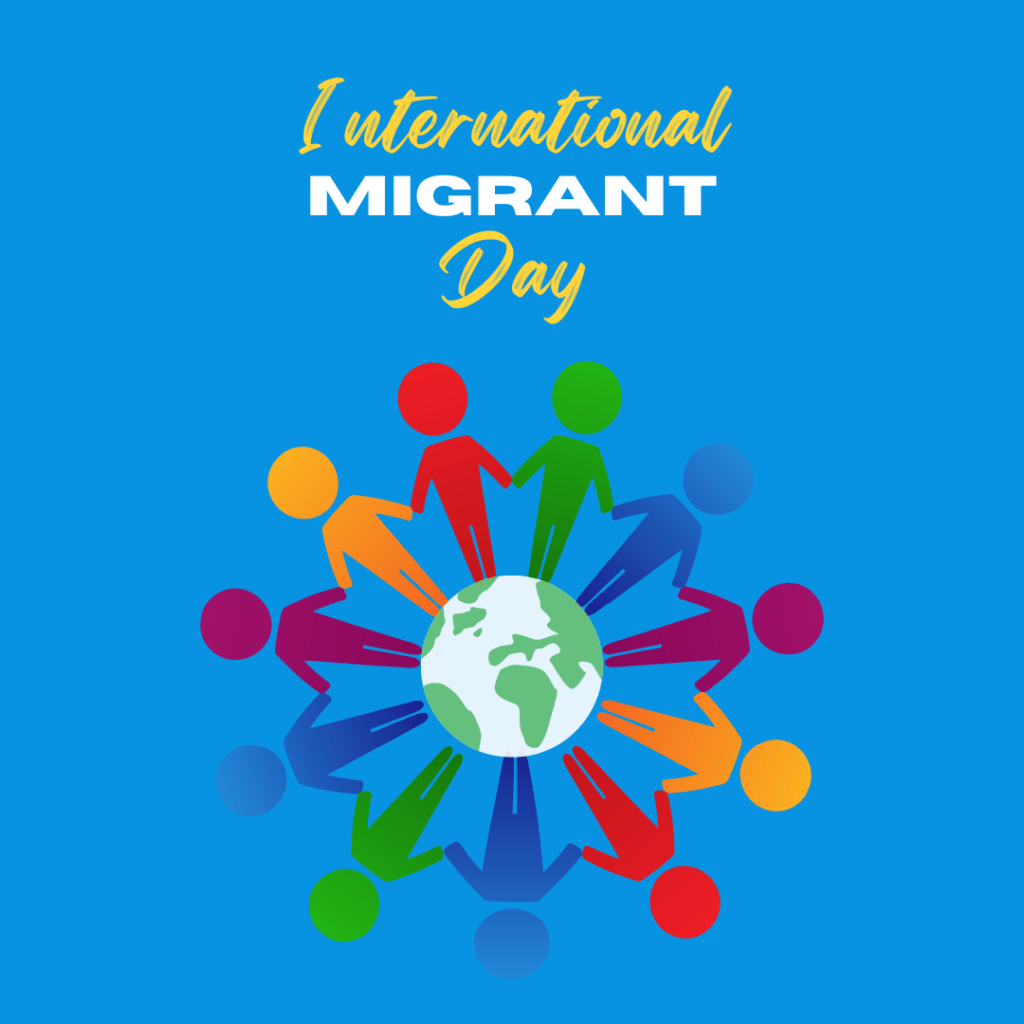When is International Migrants Day celebrated?
International Migrants Day 2024 is celebrated on Wednesday, December 18.
Also Read: Minorities Rights Day 2024: Date, History, Importance, Objectives, Challenges and Examples
Also Read: Monkey Day 2024: Date, History, Importance, Activities, Fun-facts and Quotes
Also Read: International Day of Neutrality 2024: Theme, Date, History, Importance, Activities, Quotes and FAQ’s
Why is International Migrants Day celebrated?
International Migrants Day is celebrated to highlights the contributions of migrants to societies worldwide while raising awareness about their challenges. The day recognizes the resilience of migrants who leave their homes in search of safety, better opportunities, or freedom. It aims to promote understanding of migration’s social, economic, and cultural benefits while addressing issues such as exploitation, discrimination, and access to basic rights. It’s also a call to action for governments, organizations, and individuals to create inclusive societies where migrants can thrive.
What is the theme for International Migrants Day 2024?

The theme for International Migrants Day 2024 is “Honouring the Contributions of Migrants and Respecting Their Rights,” highlights two important ideas:
- Celebrating Migrants’ Contributions: Migrants play a vital role in shaping societies through their hard work, skills, and cultural diversity. This theme encourages us to appreciate and recognize the positive impact migrants have on economies, communities, and nations.
- Respecting Their Rights: It also emphasizes the importance of ensuring that migrants are treated with dignity and fairness, with their rights protected regardless of where they come from. Everyone deserves equality, safety, and opportunity, no matter where they live or work.
This theme calls for gratitude toward migrants and a commitment to creating an inclusive and respectful environment for them worldwide.
What is the history behind International Migrants Day establishment?
International Migrants Day, observed annually on December 18, was established by the United Nations to draw attention to the growing global migration phenomenon and the rights and contributions of migrants. Its roots trace back to December 18, 1990, when the UN adopted the International Convention on the Protection of the Rights of All Migrant Workers and Members of Their Families. This milestone recognized the need to protect migrants’ rights amid the rising global migration flows.
By designating a day for migrants, the UN encourages governments, organizations, and individuals to promote understanding and take actionable steps to ensure that migrants’ fundamental freedoms and dignity are respected.
What activities are organized to mark International Migrants Day?
To mark International Migrants Day 2024, various activities are organized worldwide to celebrate and support migrant communities. Following are some common activities held during this observance:
- Cultural Festivals: Events showcasing music, dance, and cuisine from different migrant communities help promote cultural exchange and understanding.
- Film Screenings and Art Exhibitions: Films and art installations, such as those featured in the Global Migration Film Festival, share powerful migrant stories and experiences.
- Educational Workshops and Seminars: Discussions, panel talks, and workshops with migration experts and activists help educate people on migration issues, including human rights, integration, and health challenges faced by migrants.
- Community Outreach and Support: Nonprofits and local organizations host events such as health check-ups, legal aid sessions, and job fairs to support migrant communities directly.
- Advocacy Campaigns: Governments and organizations run campaigns to encourage policies for migrant safety, inclusion, and dignity.
What are the most common reasons for migration globally?

Migration is driven by various factors, broadly categorized into economic, social, political, and environmental reasons:
- Economic Opportunities: Many people migrate in search of better job prospects, higher wages, and improved living standards.
- Conflict and Persecution: Wars, political instability, and persecution based on ethnicity, religion, or political beliefs often force people to leave their home countries to seek safety elsewhere.
- Environmental Factors: Natural disasters like floods, hurricanes, and droughts, as well as long-term climate change impacts, drive people from their homes.
- Education and Lifestyle: Access to better education, healthcare, and a higher quality of life is another significant factor for migration.
- Family Reunification: Migrants may relocate to join family members already living abroad. This social reason is a strong motivator for international and internal migration.
- Healthcare Access: Many people move to countries with better medical facilities to receive treatment for critical illnesses or to access advanced healthcare systems unavailable in their home countries.
- Freedom and Human Rights: Migration is also driven by the desire for personal freedom, gender equality, or better human rights conditions.
What are the global challenges faced by migrants today?
Migrants face numerous challenges as they journey across borders, often seeking better opportunities or fleeing unsafe conditions. The most pressing global challenges for migrants today include:
- Economic Struggles: Many migrants encounter economic hardships, both in their home countries and as they attempt to establish new lives abroad.
- Human Rights Violations: Migrants, especially those fleeing conflict or persecution, are at high risk of human rights abuses.
- Legal and Social Barriers: Legal status can create major obstacles. Many migrants struggle with obtaining proper documentation, which can lead to them living in fear of deportation, even if they have built a life in their new country.
- Risks During Transit: Mostly Migrants face dangerous conditions during their journey. Whether crossing deserts or seas, many risk their lives due to lack of protection services, and the routes they take can be deadly.
- Climate Change and Environmental Factors: Environmental degradation, such as droughts and floods, forces people to migrate in search of more hospitable environments.
- Access to Healthcare: Migrants often face difficulties accessing healthcare due to lack of legal status, language barriers, or lack of affordable healthcare options in their host countries.
- Psychological Stress and Trauma: Migrants often carry the emotional burden of leaving their homes, enduring perilous journeys, or facing trauma from violence, conflict, or persecution.
How does the UN promote migrant rights on International Migrants Day?
On International Migrants Day, the UN highlights the importance of migrant rights and strives to promote their protection and well-being. This is achieved through a variety of actions. The United Nations has continuously advocated for better governance of migration, focusing on its humane and orderly management. The UN emphasizes the need for policies that ensure the protection of migrant rights, promote their dignity, and prevent exploitation and abuse, especially by traffickers.
One major initiative is the Global Compact for Safe, Orderly, and Regular Migration, which was adopted by the international community. This compact serves as a key framework for cooperation among nations, helping them create safer migration pathways and enhance the rights of migrants.
How can individuals contribute to raising awareness about migrants’ rights?
Individuals can play a vital role in raising awareness about migrants’ rights through various meaningful actions. Following are some ways they can contribute:
- Education and Advocacy: Individuals can educate themselves and others about migrant rights by staying informed on migration issues.
- Supporting Campaigns and Events: Individuals can participate in or organize awareness campaigns and events such as rallies, conferences, and social media movements that focus on migrant rights.
- Volunteering and Donations: Volunteering for organizations and Donations that support migrants can directly contribute to improving the lives of migrants.
- Art and Creativity: People can engage in creating or supporting art that tells the stories of migrants, whether through murals, performances, or exhibitions.
- Challenging Xenophobia and Discrimination: By speaking out against xenophobia, racism, and discrimination towards migrants, individuals can create a more inclusive environment.
What role does the International Organization for Migration (IOM) play on this day?
Following are the key points about the role of the International Organization for Migration (IOM) on International Migrants Day:
- Promotion of Migrant Rights: The IOM advocates for the protection and well-being of migrants, ensuring they are treated with dignity and respect across the globe.
- Global Cooperation for Migration: The IOM supports the Global Compact for Migration, which aims to create safer migration pathways and encourages countries to work together to address migration challenges.
- Empowerment of Migrants: The organization uses International Migrants Day to empower migrants, highlighting their contributions to societies.
- Advocacy and Campaigns: On this day, the IOM organizes campaigns and events to raise awareness about migrant rights, combat xenophobia, and encourage positive perceptions of migration.
- Focus on Migration’s Positive Impact: The IOM emphasizes the positive aspects of migration, such as economic growth, cultural diversity, and resilience, which contribute to strengthening societies.
- International Dialogue and Outreach: The IOM fosters dialogue among stakeholders to improve migration management policies and enhance cooperation among nations.
How does migration contribute to economic growth in host countries?

Migration can significantly contribute to economic growth in host countries through several key mechanisms:
- Filling Labor Gaps: Migrants often take up jobs in sectors facing labor shortages, contributing to industries such as agriculture, construction, and healthcare.
- Boosting Innovation: Skilled migrants, especially in fields like science, technology, engineering, and mathematics (STEM), help foster innovation.
- Economic Diversity: Migration enhances economic diversity, enabling host countries to access a wider range of skills, cultural perspectives, and business practices.
- Remittances: Migrants often send money back home, which can have a positive impact on both the host and origin countries.
- Consumption and Demand: Migrants contribute to increased demand for goods and services, which stimulates economic growth.
- Entrepreneurship and Job Creation: Many migrants bring entrepreneurial skills and start businesses, creating jobs for others.
- Aging Population Relief: In countries with aging populations, migrants help balance the workforce by contributing to the labor force, especially in younger demographics.
What are some best quotes for International Migrants Day 2024?
Following are the best quotes for International Migrants Day 2024:
- Migration is not just about crossing borders; it’s about breaking barriers and opening hearts.
- Migrant workers contribute more than their labor—they bring new perspectives, ideas, and solutions that enrich their host countries.
- Every migrant’s journey is a testament to resilience, hope, and the unyielding will to build a better future.
- Migration is not a threat, it is an opportunity. It brings diversity, culture, and innovation to societies across the world.
- The strength of a nation lies in its diversity, and migrants are key to its growth and progress.
- Migrants are not a burden; they are a source of cultural, social, and economic wealth.
- Let us celebrate the resilience of migrants who, despite adversity, continue to shape the world for the better.
- Our world is made richer, not poorer, by the stories and struggles of migrants.
- In the eyes of a migrant, the journey is not just a path; it is a pursuit of dreams, opportunity, and a better tomorrow.
- Migrants are not outsiders; they are an essential part of every community they touch.


